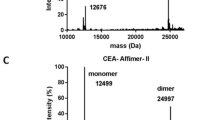Abstract
Carcinoembryonic antigen (CEA) is highly expressed by most tumours of gastrointestinal origin, but its use as a target for tumour therapy is complicated by the high levels of soluble CEA that are found circulating in the blood of cancer patients. A monoclonal antibody PR1A3 has been prepared, which binds preferentially to cell-surface rather than soluble CEA, this cell selectivity should make PR1A3 an ideal candidate for antibody-targeted tumour therapy. PR1A3 has been humanised and shown to retain its cell-surface specificity and affinity. Stable expression of the humanised antibody from chinese hamster ovary (CHO) cells has been achieved after transfection and amplification. Since PR1A3 binds preferentially to cell-associated CEA, a cell-free enzyme-linked immunosorbent assay (ELISA) has been developed to allow characterisation and routine assay of the antibody. This assay was developed using a recombinant chimeric protein constructed by cloning the domain of CEA that is bound by PR1A3 (the B3 domain) into a hybrid gene containing the Fc portion of IgG and three domains of biliary glycoprotein. Stable expression of this hybrid protein has been achieved from CHO cells. In ELISA both humanised and murine PR1A3 bound strongly to this antigen but only at a minimal level to soluble CEA. Two binding sites for the antibody were found on the gastric carcinoma cell line MKN45, one of higher affinity (1 nM) and the other at lower affinity (60 nM). Similar affinities were found for both murine and humanised antibodies. The data presented make it unlikely that the differential binding to cell-surface as distinct from soluble CEA can be accounted for by low affinity of PR1A3 for CEA, and provides further support for the hypothesis that some conformational change takes place on CEA release from cells and that it is this change that blocks PR1A3 binding to its epitope.
Similar content being viewed by others
Author information
Authors and Affiliations
Additional information
Received: 5 October 1998 / Accepted: 19 November 1998
Rights and permissions
About this article
Cite this article
Stewart, L., Young, S., Watson, G. et al. Humanisation and characterisation of PR1A3, a monoclonal antibody specific for cell-bound carcinoembryonic antigen. Cancer Immunol Immunother 47, 299–306 (1999). https://doi.org/10.1007/s002620050534
Issue Date:
DOI: https://doi.org/10.1007/s002620050534




